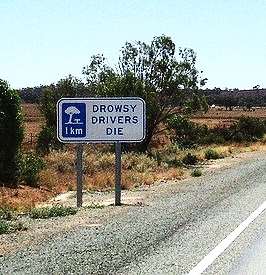Reports have shown that driving on 5 hours of sleep or less is equivalent to driving while intoxicated. The report, according to USA Today, states that drivers who skip a few hours of sleep at night nearly double their chances of crashing. This is an alarming fact when you take into consideration that about 1/3 of American adults get less than 7 hours of sleep every night, the recommended amount for adults aged 18-60, based on statistics from the Center for Disease Control and Prevention (CDC).
The Probability of Drowsy Driving Car Crashes
Below is the likelihood of a motor vehicle accident occurring depending on how much sleep a driver gets.
- 6 hours of sleep = 1.3 times higher chance of a car crash.
- 5 - 6 hours of sleep = 1.9 times higher chance of a car crash.
- 4 - 5 hours of sleep = 4.3 times higher chance of a car crash.
- 4 hours of sleep or less = 11.5 times higher chance of a car crash.
The National Highway Traffic and Safety Administration (NHTSA) estimates that drowsy driving accounts for 83,000 crashes per year. In 2014, 846 fatalities resulted from a car crash related to sleepy driving. It should be noted that research on the number of drowsy drivers on the road has proved challenging, possibly even causing an underestimate of the prevalence of the issue. Regardless, lack of sleep causes impaired judgment, a slower reaction time, and/or paying less attention to the road. Combining these factors with operating a motor vehicle, just screams a disaster waiting to happen.
Symptoms of Drowsy Driving:
- Frequent yawning or blinking.
- Drifting in and out of the lane.
- Hitting a rumble strip on the freeway.
- Missing an exit.
- Not remembering the last few miles traveled.
The National Sleep Foundation noted that police officers are not trained to identify “drowsiness” and despite just about every state addressing sleepiness or fatigue in crash reports, fatigue testing has been limited and without major developments. The foundation also believes that drowsy driving could play a role in other car crashes and are simply misreported as drunk driving or distracted driving accidents. The following safety tips provided by the National Sleep Foundation maybe able to help prevent a drowsy driving motor vehicle accident from occurring.
Tips to Avoid Drowsy Driving Car Accidents
- Make it a priority to get 7-8 hours of sleep per night.
- Get a good night's sleep before long road trips, as being sleep deprived could endanger everyone in the car.
- Avoid drinking any alcohol before driving. Consumption of alcohol increases sleepiness and impairment for drivers.
- If you take medications that list drowsiness as a side effect, use public transportation or get a ride from someone else, if possible. If you drive, avoid peak sleepiness time periods (12 AM - 6 AM and late afternoon).
- Stay vigilant for signs of drowsiness, such as crossing over roadway lines or hitting a rumble strip, and pull over for a short nap in a safe place if needed.
At the end of the day, having the alert senses needed to drive safely is yet another reason to get enough sleep each night. It is important to remember these safety tips and to monitor one's own behavior for drowsiness, before getting behind a steering wheel. At the very least, who doesn't want an excuse to put on some footie pajamas and snuggle under the covers for a well-rested night?
Motorists should take note of when they are feeling fatigued, and make the right decisions in order to prevent severe injuries or even fatalitities from a car crash. Finding a safe spot to pull out of the way of traffic and removing one's keys from the ignition to take a quick nap is one of way options to make a road trip safer. If you or someone you know has been a victim of a drowsy driving accident, contact The Michigan Law Firm, PLLC at 844.4MI.FIRM for a free consultation.



